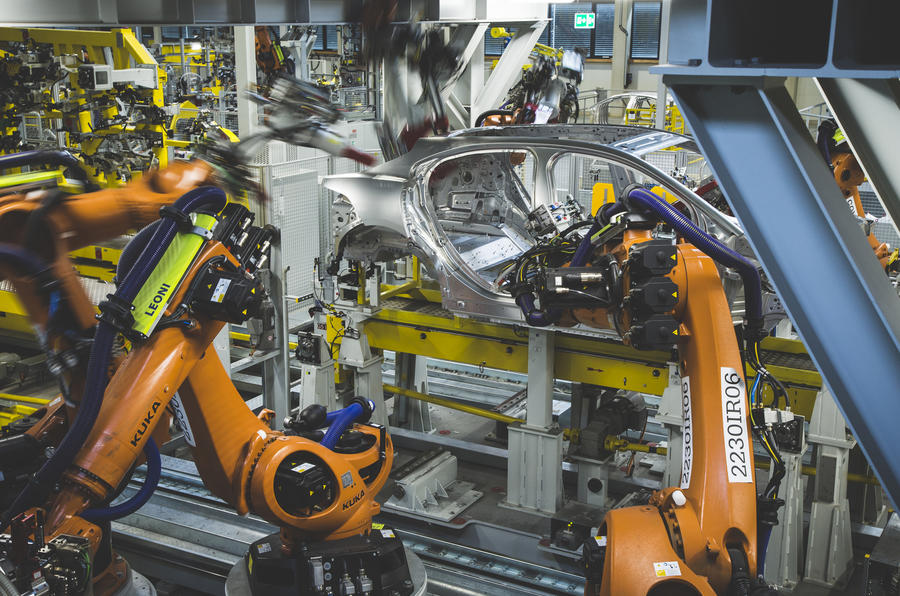Car production in the UK fell by 41.4% in October as manufacturers continued to feel the strain caused by the semiconductor crisis and other supply issues, the Society of Motor Manufacturers and Traders (SMMT) has announced.
Factories produced 64,729 cars, representing the fourth consecutive month of decline and the weakest October figure since 1956. Year-to-date output dropped by 2.9% to 721,505.
Numbers dropped due to production stoppages caused by the on-going shortage of chips and were exacerbated by the permanent closure of Honda's Swindon plant in July, the SMMT said, noting that the deficit could impact figures for a year.
However, the uptake of electrified cars remained healthy, with battery electric vehicles (BEVs), plug-in hybrids (PHEV) and hybrids (HEV) comprising 30% of October production.
Production of zero-emissions models reached 50,000 for the year so far - more than the 43,790-unit figure achieved in 2019, as manufacturing of EVs rose by 17.5% to 8454 units.
“These figures are extremely worrying and show how badly the global semiconductor shortage is hitting UK car manufacturers and their suppliers,” said SMMT chief executive Mike Hawes.
“Britain’s automotive sector is resilient, but with Covid resurgent across some of our largest markets and global supply chains stretched and even breaking, the immediate challenges in keeping the industry operational are immense."
The SMMT suggests the UK government can support the industry with measures to raise competitiveness with global rivals, in “tackling high energy costs, supporting employment and training and helping businesses whose cashflow is under pressure from these historically poor production numbers.”





Join the debate
Add your comment
Gav how many more times are you going to recycle that same post about car price inflation? WE HEAR YOU. You're as bad as xxxx with his PHEV comments!
There is a solution to your problem - you can ignore my comments (I'm assuming you come here to read the Autocar articles rather than my comments but I'm flattered you take such an interest in them) and let others who occasionally come here and are unaware of the ridiculous car price inflation situation to be enlightened.
You never know, I might have saved them a fortune from avoiding a costly mistake - I'd much rather put my hard earned money into an appreciating asset and cheaper alternative methods of transport than a new car theses days than something that depreciates at a huge rate, or takes my money with interest without anything to show for it.
I haven't bought a new car for a few years now because I resent paying for the huge car price inflation in recent times (the car makers are rapidly increasing the price of ICE cars to close the price gap with EVs to con people into thinking EVs are becoming more attractively priced).
Finance packages have been great for car makers in hiding huge price leaps behind adjustable monthly payments (that can be adjusted to suit them i.e. low monthly sums but they hide the deposit, "future value", interest rate and time to pay it back in the small print).
Then every tiny facelift is used as an extra excuse to push up prices by a few grand. A recent example is the Suzuki S-Cross - billed as a new car but looking very similar inside and out to the car it replaces, and using the same engine, yet has a price leap of £4000 for the entry model. And that's from a car maker considered a budget make so you can guess what the others are getting up to.
Whilst people who used to change their cars every couple of years (like me) hold on to what they've got for much longer, that leaves people buying on Finance (who don't care about being perpetually in debt for tens of thousands of pounds plus interest and never actually own their cars) or older people from the golden age of final salary pensions with nothing better to spend their money on.
For the rest, there could be chip shortages, opinion-based BREXIT arguments or any other excuse the SMMT wishes to dream up, but to us it's that we don't want to pay ridiculous amounts for even the most boring, underpowered shopping trolley (the near £20k non-hybrid VW Polo springs to mind).
What a weird, anti-German rant by 567. Please try comparing the strength of the automotive sector in Germany with that in the UK (with BMW, VW, Mercedes and now Tesla) dominating the landscape.
I was replying to Andrew1 and not you. How my comment to Andrew1 an "anti-German rant"? Maybe you should stop getting all your information from main stream media. If you read other sources and listened to actual German people they would tell you it's not all rosey in Germany. I'm guessing you haven't read what is planned by the next German Government headed by their new Chancellor Olaf Scholz? Finally, I agree that the German and USA automotive sectors are better than the UK's. The UK should have invested in their own automotive sector since the 1970s however decided to invest in the City of London which now is the second largest financial hub on Earth which both the Germans and Americans use.